Hangzhou, China – At the 5th World Congress of Biosphere Reserves (WCBR), organized by the United Nations Educational, Scientific and Cultural Organization (UNESCO) in Hangzhou, China, BGI Group showcased its commitment to advancing global conservation by initiating a partnership with UNESCO to drive genomics innovation for global biodiversity conservation.
The WCBR, a global meeting held every ten years, serves as a key milestone to evaluate progress, share experiences, and set future directions for the "Man and the Biosphere (MAB) Programme." For the first time, the WCBR is being held in China and Asia, bringing together over 4,000 delegates from more than 150 countries to assess progress, exchange knowledge, and chart the course for the next decade.
Advocating for Multi-Omics Technology Integration in Biosphere Reserves
Dr. Siqi Liu, Co-founder of BGI Group, participated in a high-level roundtable on biodiversity, science, and education with UNESCO chairholders and senior coordinators. He emphasized integrating multi-omics technologies into the daily management of UNESCO Biosphere Reserves and World Heritage sites, supporting the "Digital Earth" vision through practical ecological monitoring.
Dr. Liu underscored BGI's commitment to making advanced genomic tools accessible and affordable for research and education. As a key contributor to the Earth BioGenome Project (EBP), BGI has developed comprehensive solutions for complete genome assembly and single-cell and spatiotemporal omics systems for multidimensional life analysis. These technologies are already delivering practical conservation solutions, as demonstrated in projects like the Giant Panda Genome Project, which enables real-time ecosystem monitoring, genetic baseline mapping, species reintroduction, and invasive species management.
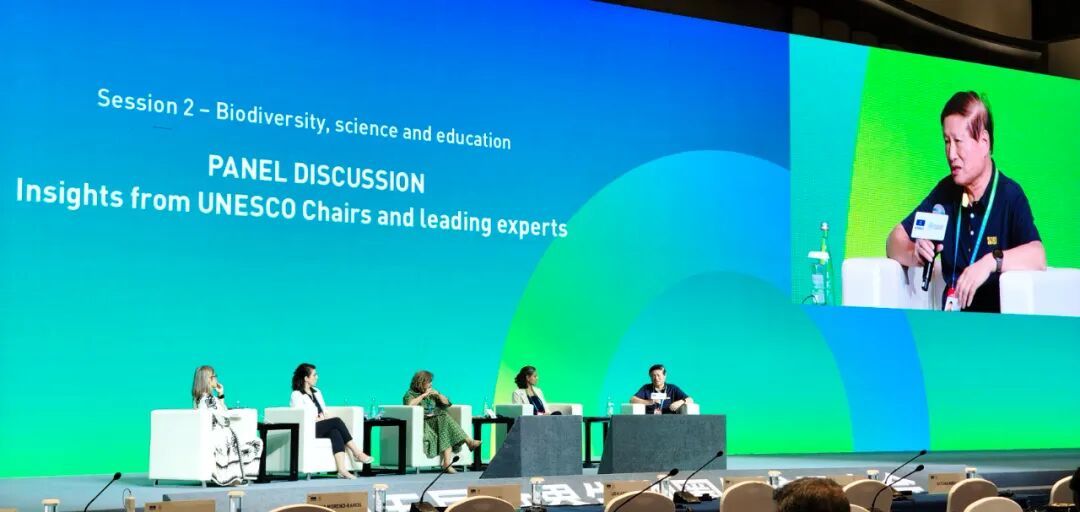
Dr. Siqi Liu, co-founder of BGI Group, at the panel discussion of the 5th WCBR. (Credit:5th WCBR organizing committee)
Showcasing Digitalization Efforts in Wild Animal and Plant Conservation Research
Dr. Qiye Li, Senior Researcher and Director of the Digital Earth Research Institute at BGI-Research, presented at the parallel meeting titled “Conservation Research in Wild Animals and Plants in China." He introduced BGI's efforts to digitize species through initiatives such as the Earth BioGenome Project (EBP) and the “Bird 10,000 Genomes Project” (B10K). Dr. Li explained how genomic data contributes to the protection of endangered species and advances research on the evolution of life. He also showcased the potential of AI in gene resource discovery, emphasizing the importance of biodiversity digitization and global collaboration.
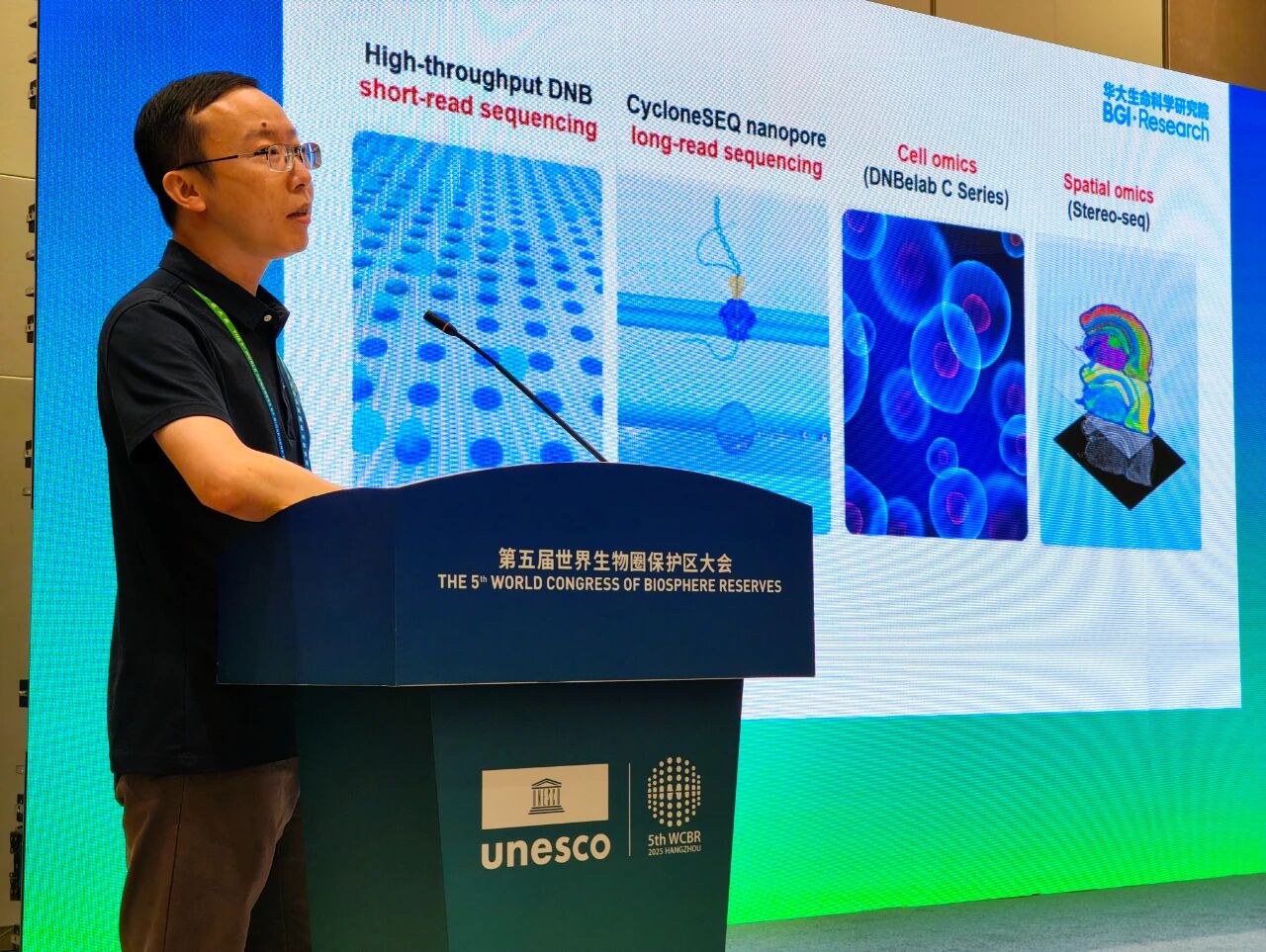
Dr. Qiye Li, Senior Researcher and Director of the Digital Earth Research Institute at BGI-Research, giving a speech about conservation research in wild animals and plants.
Initiating Partnership with UNESCO to Drive Genomics Innovation for Global Biodiversity Conservation
At the parallel forum "Genomics for Biodiversity Conservation," BGI Group announced its partnership with UNESCO, showcasing the transformative role genomic technologies play in conservation efforts. The event also highlighted BGI’s global innovation education strategy, cutting-edge genomic technologies, and recent achievements in biosphere conservation, all closely aligned with UNESCO’s mission.
Mr. Antonio De Sousa Abreu, Director of the Division of Ecological and Earth Sciences of UNESCO and Secretary of the MAB Programme, delivered the keynote address. He acknowledged the limitations of traditional survey methods in addressing rapid environmental changes and emphasized that a deepened partnership with BGI Group—leveraging advanced genomic, environmental DNA, and multi-omics platforms—would bring crucial momentum to the Biosphere Reserve network and advance data-driven conservation.
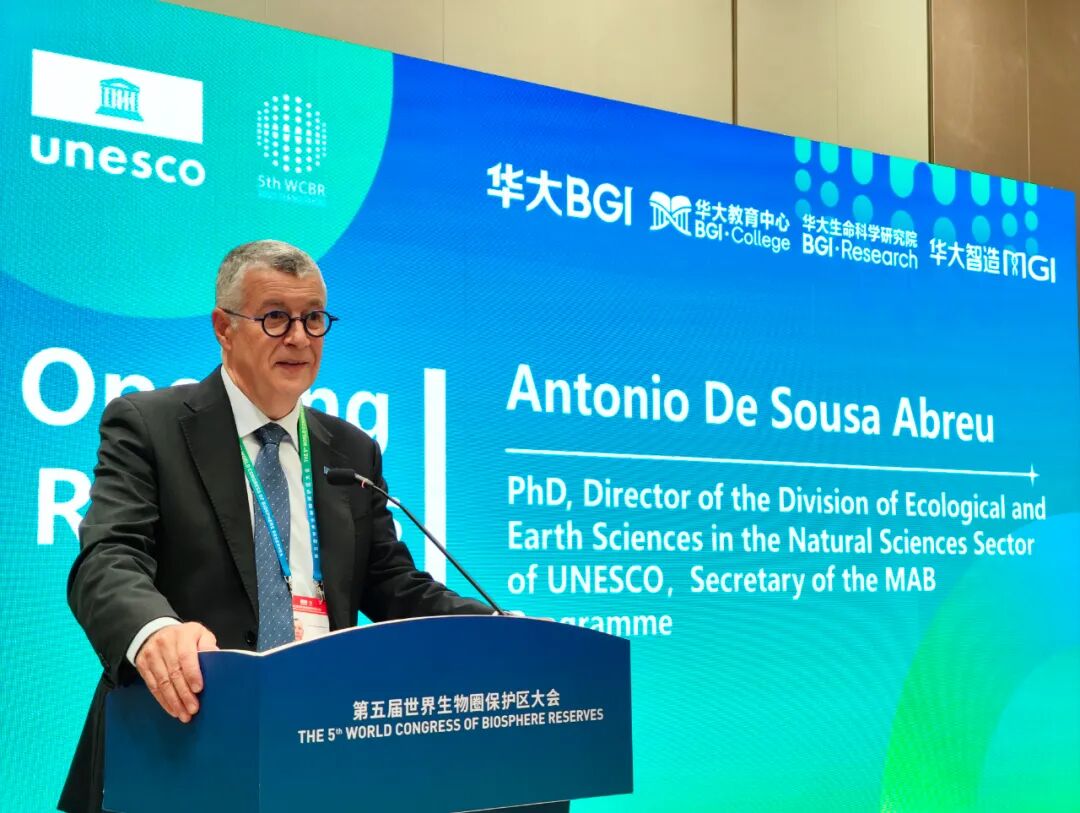
Mr. Antonio De Sousa Abreu, Director of the Division of Ecological and Earth Sciences of UNESCO and Secretary of the MAB Programme, is addressing the parallel forum.
Dr. Siqi Liu elaborated on how BGI’s proprietary sequencing platforms and multi-omics technologies have enabled the creation of “digital life archives” from tens of thousands of global biological samples over the past two decades. He emphasized that embedding these resources into the Biosphere Reserve network through the BGI-UNESCO partnership will accelerate a global shift from experience-based to data-driven ecological conservation.
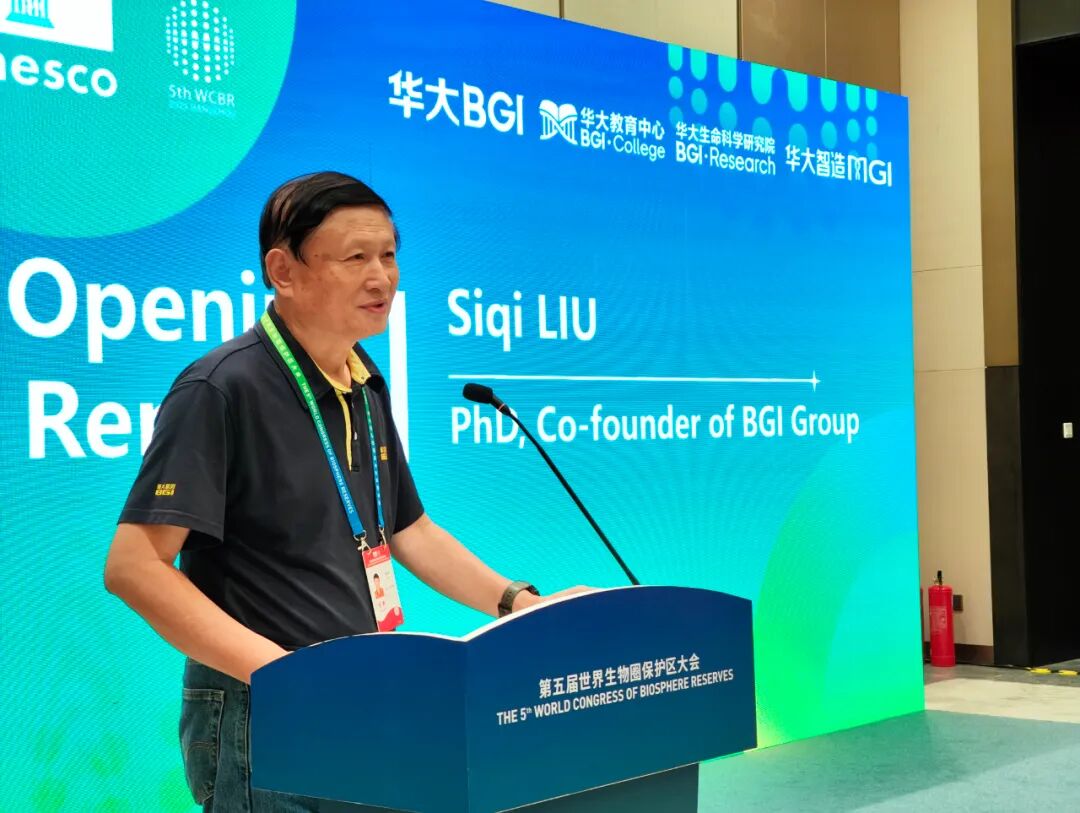
Dr. Siqi Liu, speaking at the parallel forum, emphasized how the BGI-UNESCO partnership will accelerate the transition to data-driven ecological conservation.
Dr. Minfeng Xiao, Deputy Dean of BGI-College, presented BGI’s 26-year contributions to gene sequencing, agricultural ecology, and biodiversity conservation. She introduced BGI’s innovative educational model, which transforms the group’s technological expertise into systematic training programs to cultivate the next generation of professionals.
Dr. Xiao also outlined its science education courses and joint-training system, which include short-term programs such as online courses, offline workshops, and a new summer internship. These initiatives integrate genetic experiments and research content into immersive learning experiences, utilizing BGI Group’s genomic technologies to foster innovation and scientific literacy.
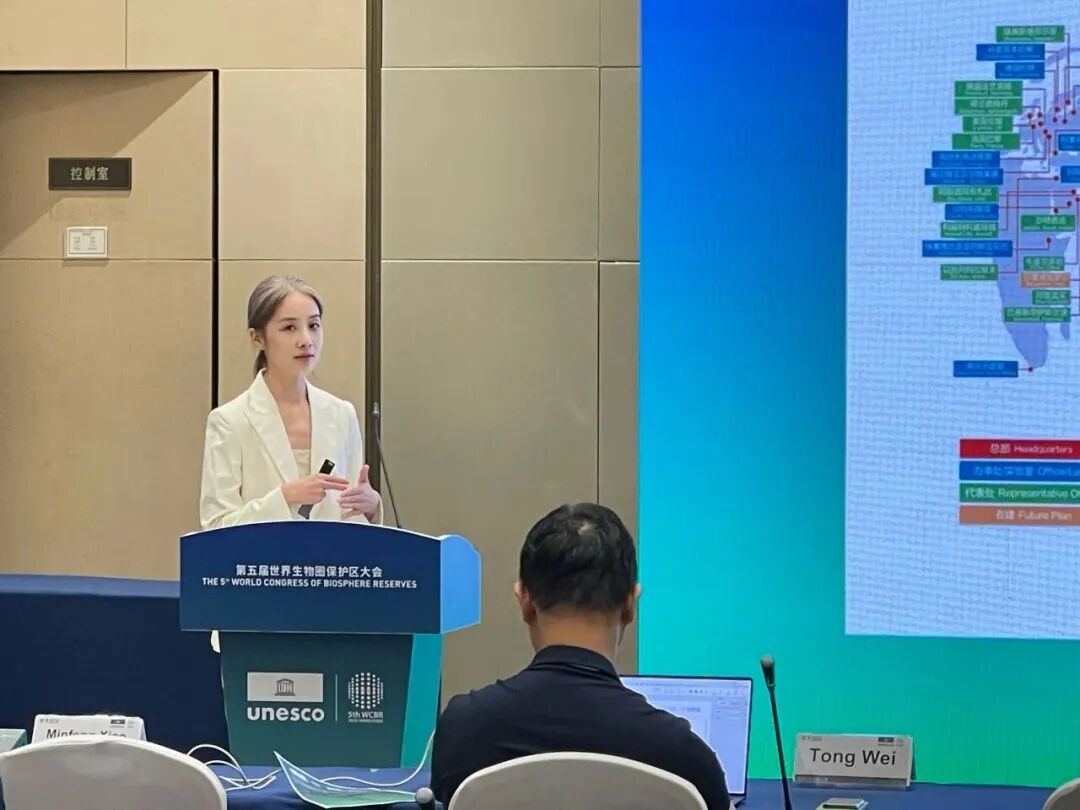
Dr. Minfeng Xiao, Deputy Dean of BGI-College, presented BGI’s educational model, turning technological expertise into training programs to develop future professionals.
DNA Sequencing: A Prerequisite for Future Biodiversity Conservation
DNA sequencing is a key prerequisite for future biodiversity conservation and even the potential revival of extinct species. At the parallel forum, Dr. Chentao Yang, Associate Researcher and Deputy Director of the Digital Earth Research Institute at BGI-Research, delivered a keynote speech highlighting BGI's genomics sequencing and analysis solutions. This solution integrates genomics, cell omics, and spatiotemporal omics, offering a new multidimensional understanding of life. He emphasized the need to use these technologies to accelerate the digitization of endangered species, working together to create a sustainable future.
Dr. Tong Wei, Chief Scientist of Plant Omics Center at BGI-Research, delivered a presentation on global collaboration for plant diversity research and conservation, introducing the “10,000 Plants Genome Project(10KP)”, a major scientific initiative launched by BGI and its partners in 2017. Notably, in 2024, BGI, together with the International Union for Conservation of Nature (IUCN), Fairy Lake Botanical Garden, Western Sydney University, Huntington Botanical Gardens, and other institutions, initiated the Global Cycad Genome Project. This project aims to conduct conservation genomics research on cycads, providing a showcase for endangered species conservation.
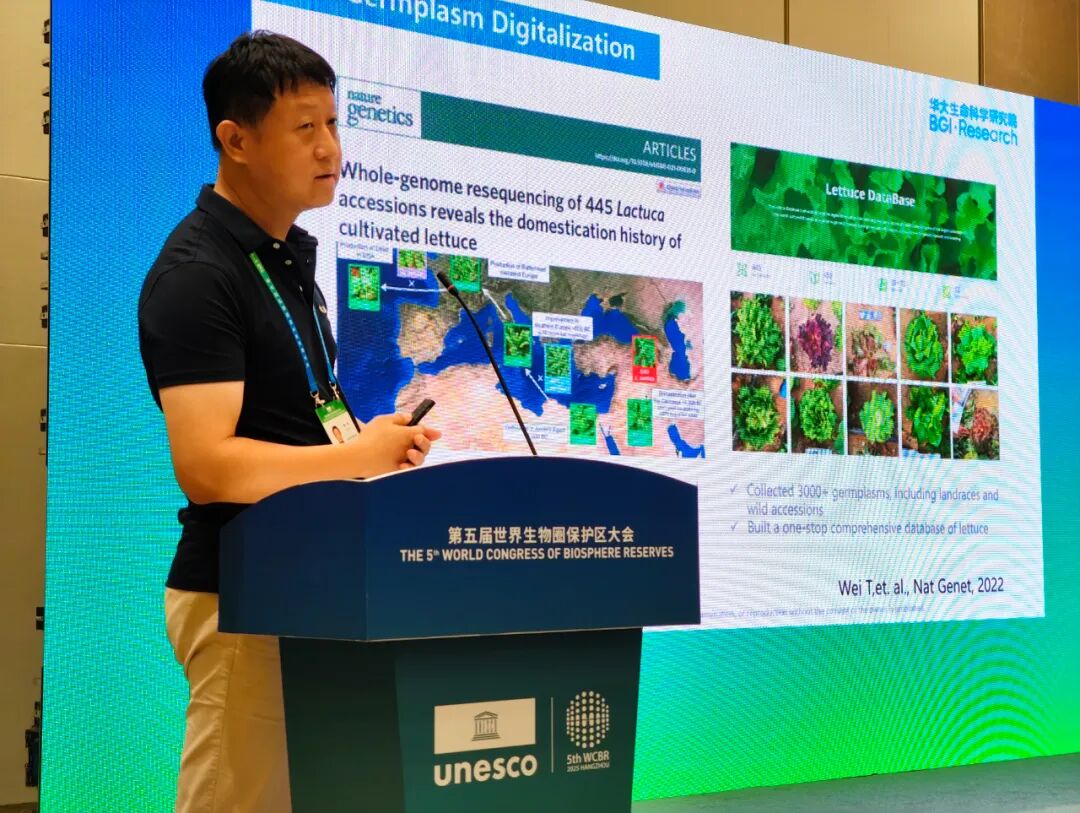
Tong Wei, Chief Scientist of the Plant Omics Center at BGI-Research, delivered a presentation on BGI’s role in advancing global collaboration for plant diversity research and conservation.
Shaping the Future of Global Biodiversity Conservation
The 5th World Congress of Biosphere Reserves (WCBR) marks a pivotal moment for the MAB Programme, shaping the 2026–2035 MAB Strategy and Action Plan and setting its trajectory for the coming decade in alignment with the Sustainable Development Goals (SDGs), global biodiversity targets, and the Lima Action Plan's legacy. BGI Group, as a key partner, plays a vital role in global biodiversity conservation by leveraging cutting-edge genomic technologies and fostering international collaborations to support the MAB Programme's mission of sustainability and innovation.
Looking ahead, BGI Group aims to strengthen its partnership with UNESCO and other stakeholders to advance the application of genomic technologies in biodiversity conservation, providing robust scientific support to achieve a global vision of harmonious coexistence between humanity and nature.



